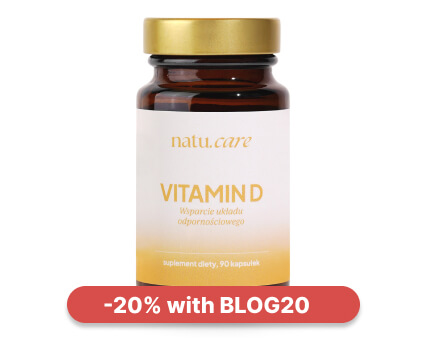Hypothyroidism: causes, symptoms, treatment and diet
Is hypothyroidism a verdict? Find out what research, experts and patients say about it.


Learn more about our editorial process
.

Learn more about our editorial process
.

Learn more about our editorial process
.

Learn more about our editorial process
.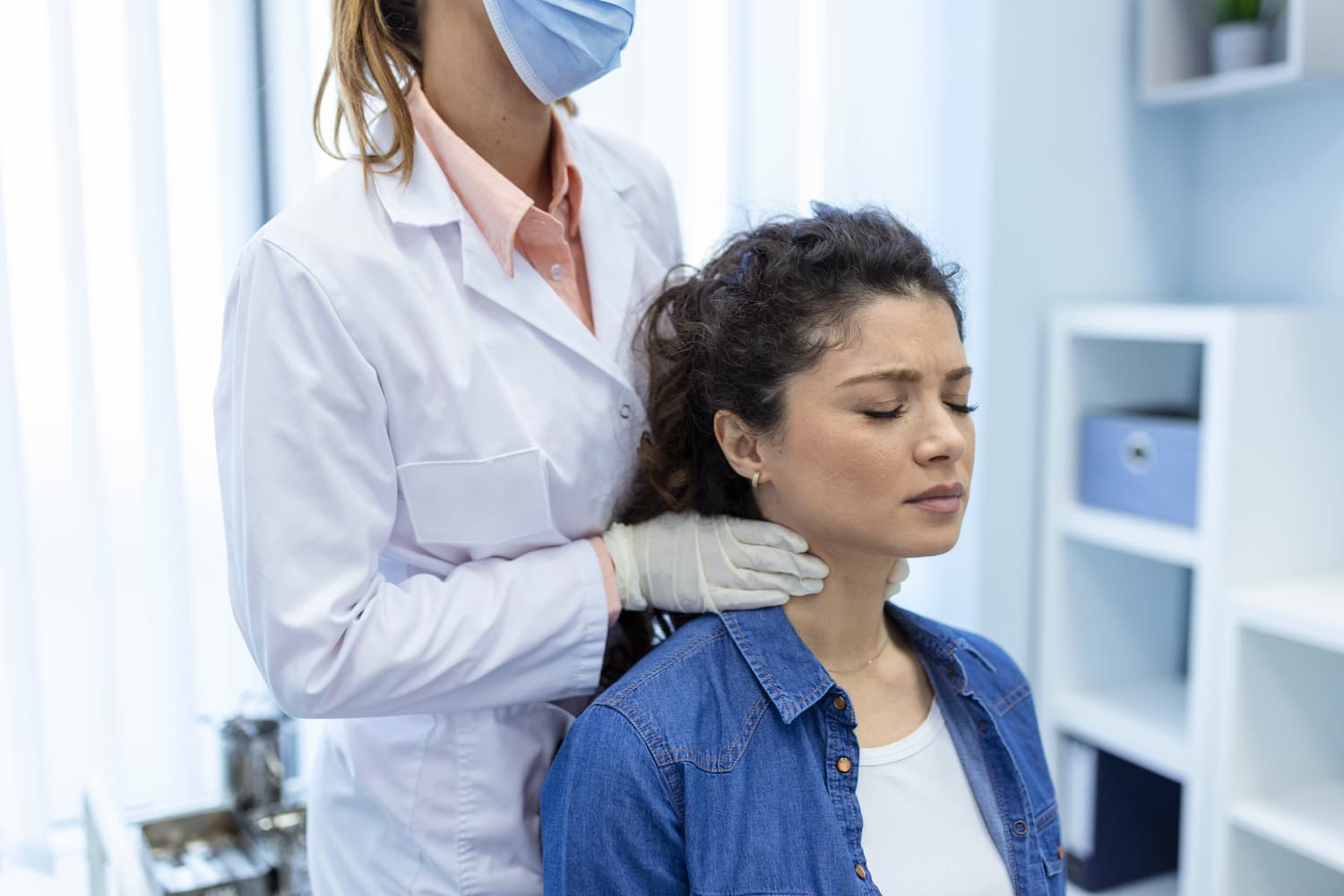
Why you can trust us
Articles on Natu.Care are written based on scientific research, data from government websites and other reliable sources. The texts are written in cooperation with doctors, nutritionists and other health and beauty experts. Articles are reviewed before publication and during significant updates.
.Learn more about our editorial process
.Information about advertisements
Content on Natu.Care may contain links to products from the sale of which we may receive a commission. When creating content, we adhere to high editorial standards and take care to be objective about the products discussed. The presence of affiliate links is not dictated by our partners, and we select the products we review ourselves completely independently.
.Learn more about our terms and Conditions
.It affects at least 5% of people worldwide. Its symptoms are easily overlooked and trivialised because initially the symptoms are difficult to distinguish from the normal hardships of everyday life.
Hypothyroidism has already been called a disease of civilisation. However, the diagnosis is not a sentence. Hypothyroidism can be controlled and, despite the inconveniences associated with its course, we can enjoy life to the full. Together with Witold Tomaszewski, MD, PhD, and clinical nutritionist Julia Skrajda, we suggest how to do it.
.
From this article you will learn, among other things:
.- What is hypothyroidism and what symptoms it gives.
- What is hypothyroidism?
- Who is in the high-risk group.
- How to manage hypothyroidism.
- How to cope with hypothyroidism on a day-to-day basis.
- How to cope with hypothyroidism.
- What to do to recover but at the same time not give up on life. .

Sprawdź, za co pokochały go tysiące klientek Natu.Care Premium Omega-3ᵀᴳ -15% z kodem BLOG15
Natu.Care Omega-3ᵀᴳ Premium
Natu.Care Omega-3ᵀᴳ Premium dla zdrowia serca, mózgu i odporności. Najlepsza przyswajalność. Optymalna dawka 750 mg. Przebadana przez niezależne laboratorium.
Zobacz więcej
Produkt ma super skład, transparentną etykietę i co dla mnie jest ważne – małe kapsułki do połknięcia. Nie ma też nieprzyjemnego efektu odbijania rybą, który miałam spożywając inne produkty. Widzę znaczną poprawę odporności. Polecam!@Kasia P.
Are you experiencing the symptoms described in the article? Perform thyroid tests and consult an endocrinologist. Early diagnosis means a better chance of effective treatment!
See also:
- Thyroid - what it is, functions, tests, diseases and treatment .
- Hypothyroidism: symptoms, causes, treatment [Doctor's advice] .
- Hashimoto's disease: what is it, symptoms, what tests, how to treat? .
- Psoriasis: causes, symptoms and treatment .
- Thyroid research .
- Cortisol testing
- Liver tests
- Blood tests
What is the thyroid gland and what is it responsible for in our body?
.
The thyroid gland is a small organ that is located at the base of the neck, slightly below the laryngeal cartilage. It is classified as one of the so-called endocrine glands, and its main function is the production and release of two hormones: triiodothyronine (T3), and thyroxine (T4).
The thyroid gland is responsible for the production and release of two hormones.
Both hormones are responsible for regulating the functioning of most of your body's tissues, are responsible for thermogenesis (i.e. stimulating the body to heat up), and also affect our metabolism. In addition to this, they are also involved in your body's growth process, regulate the heart and the entire vascular system, and help maintain mental-emotional balance.
Thyroid function is controlled by the pituitary gland, more specifically by the thyrotropic hormone (TSH) it produces, which stimulates the gland to produce T3 and T4.
What is hypothyroidism?
.
Hypothyroidism is a condition in which the thyroid gland does not produce and release enough hormones to satisfy all the necessary functions and processes in our body. Based on the causes, there are three types of hypothyroidism: primary, secondary and tertiaryand.
Primary hypothyroidism
.
It is caused by a direct disruption of hormone production by the thyroid gland. It is characterised by high TSH levels and low FT4 levels.
Recurrent hypothyroidism
.
It is diagnosed by finding abnormalities in the production of thyrotropic hormone (TSH) by the pituitary gland.
Tertiary hypothyroidism
Tertiary hypothyroidism
.
This is referred to when there is a disruption in the synthesis or secretion of thyroxine (TRH) by the hypothalamus (this hormone stimulates the secretion of TSH).
Subclinical hypothyroidism
Subclinical hypothyroidism
.
Subclinical hypothyroidism is a mild insufficiencyand - it is sometimes called latent or dormant. It is mainly diagnosed when thyroid hormones are within reference values and TSH levels are slightly elevated. It is estimated to affect 3-15% of people worldwide depending on where they liveand.
Hypothyroidism versus Hashimoto's disease
.
Contrary to popular belief, Hashimoto's disease is not the same as hypothyroidism. As an autoimmune disease o is nowadays one of the most common causes of hypothyroidismand. You can read about the others later in this article.
Want to know more about thyroid health?
.
See also:
.
- Thyroid - what it is, functions, research, diseases, treatment .
- Hypothyroidism: symptoms, causes, treatment .
- Hashimoto's disease: what is it, symptoms, what tests, how to treat it .
- Thyroid tests - which ones and when to do them? .
Natu.Care Collagen Premium 5000 mg, mango & passion fruit

- Collagen content: 5000 mg marine collagen hydrolysate
- Additional active ingredients: vitamin C, low molecular weight hyaluronic acid (and L-theanine and coenzyme Q10 in cocoa flavoured collagen or vitamin A and vitamin E in mango–passion fruit flavoured collagen)
- Form: powder sachets
- Dose: 1 sachet per day
- Sufficient for: 30 days
Product description
Fish collagen from the Natu.Care brand in a dose of 5000 mg, based on certified ingredients of the best quality. Regular supplementation will positively influence the appearance of the skinóry, hairów and nails – they will be rebuilt and strengthened from the inside.
In addition to collagen, which is valuable for health and beauty, it also offers other active ingredients that help to maintain a youthful complexion, shiny hair and strong nails.
The formula contains a sufficient portion of the active ingredient to positively affect joints, the musculoskeletal system and immunity.
Natu.Care Premium Collagen is available in two flavours – Cacao Bloom and Rise&Shine. Both formulas are based on the following active ingredients: marine collagen hydrolysate, wild roseóbud extract and hyaluronic acid.
Additionally, Cacao Bloom contains natural L-theanine, coenzyme Q10 and defatted Dutch cacao. Rise&Shine instead contains vitamin E and vitamin A.
These are the best collagens in the world.
These best fish collagens on the market also rós taste – Cacao Bloom is a treat for chocolate lovers. Rise&Shine will appeal to those whoólike the refreshing taste of mangoófruit and passion fruit.
Pros and cons
Pros:
- Vitamin C supports the body's collagen production, enhancing its effectiveness.
- An effective dose of hyaluronic acid, which additionally supports skin hydration and joint health.
- Fish collagen absorbs 50% better. Additionally, the manufacturer specifies the fish species it is sourced from (Atlantic cod).
- The composition has been tested by the independent and accredited J.S. Hamilton laboratory.
- MSC (Marine Stewardship Council) quality certification, which confirms that the collagen source supports sustainable fishing practices.
Cons:
- None.
Additional information
Natu.Care's fish collagen receives praise for its delicious taste. You won't find the fishy aftertaste that often comes through in other collagens. Plus, you have two tasty flavors to choose from: cocoa and mango-passionfruit.
Active ingredients like coenzyme Q10, hyaluronic acid, and natural L-theanine provide anti-inflammatory and antioxidant benefits while slowing down aging processes.
User review
Super, after about 6 weeks of use, the skin on my face became noticeably firmer. Wonderful taste.
Ania ZalewskaNatu.Care customer
Natu.Care Premium collagen 10 000 mg, mango-maracuja

- Collagen content: 10,000 mg marine collagen hydrolysate
- Additional active ingredients: vitamin C, low molecular weight hyaluronic acid (and L-theanine and coenzyme Q10 in cocoa flavoured collagen or vitamin A and vitamin E in mango–passion fruit flavoured collagen)
- Form: powder sachets
- Dose: 1 sachet per day
- Sufficient for: 30 days
Product description
One of the strongest collagens on the market, whichós provides as much as 10,000 mg in a daily serving. This allows the formula to effectively support the condition of the skin, hair and nails.
With this supplement, you will support your beauty, which will allow you to visually stop the ageing process and feel a second youth!
Natu.Care Collagen Premium 10 000 mg comes in two flavours – cherry and mango-maracuja. Both formulas have the same product backbone – collagen, hyaluronic acid and vitamin C.
In the cherry version you additionally find glucosamine, chondroitin and Indian frankincense resin extract. Mango-maracuja, on the other hand, contains vitamin E and vitamin A.
Pros and cons
Pros:
- Tested collagen formula – SeaGarden, whose effects have been confirmed in clinical studies.
- Effective dose of hyaluronic acid, additionally moisturizing the skin and positively impacting joint health.
- Vitamin C supports the body’s natural collagen production.
- The composition has been tested by the independent and accredited J.S. Hamilton laboratory.
- The product has an MSC (Marine Stewardship Council) quality certification – the collagen source supports sustainable fishing practices.
Cons:
- None.
Additional information
Users praise Natu.Care Collagen Premium for the easy dissolvability of the powder.
User review
I noticed a significant improvement in my skin texture after a few weeks of taking collagen regularly. My complexion is now as soft as velvet!
Natu.Care Collagen Premium 10000 mg, cherry

- Collagen content: 10,000 mg of hydrolyzed bovine collagen
- Additional active ingredients: vitamin C, low molecular weight hyaluronic acid, glucosamine, chondroitin, extract of Indian frankincense resin (boswellia serrata)
- Form: powder sachets for drinking
- Serving: 1 sachet per day
- Lasts for: 30 days
Product description
One of the strongest collagens on the market, providing as much as 10,000 mg per daily serving. This product can effectively support the condition of joints, skin, hair, and nails.
With this supplement, you will support your skeletal and joint system as well as your beauty, helping you visually halt the aging process and feel rejuvenated!
Pros and cons
Pros:
- The daily portion of collagen is very large – as much as 10,000 mg.
- Proven collagen formula – COLLinstant, whose effectiveness has been confirmed in clinical studies.
- Effective dose of hyaluronic acid, which additionally moisturizes the skin and positively affects joint health.
- Vitamin C supports the body's natural collagen production.
- Glucosamine is a fundamental building block of compounds found in joint cartilage and a component of collagen that gives elasticity to connective tissue in tendons.
- Chondroitin is a natural component found in the human body, mainly in cartilage. This large molecule (mucopolysaccharide) has the ability to absorb water, which helps maintain the elasticity and resilience of cartilage.
- Frankincense resin extract supports blood circulation and joint mobility and reduces their stiffness. It may help alleviate inflammatory conditions.
- The composition has been tested by the independent and accredited J.S. Hamilton laboratory.
Cons:
- None.
Additional information
Users praise Natu.Care Collagen Premium for the easy dissolving of the powder.
Premium Sodium Butyrate
Product description
Premium Sodium Butyrate is a natural support for your digestive system. With a high dose of butyric acid (940 mg), it supports the regeneration of the intestinal mucosa, improving gut health and function, and aids in the absorption of nutrients. By taking care of your intestines, you're taking care of the health of your entire body.
Studies involving people suffering from irritable bowel syndrome confirm that sodium butyrate is ideal for supporting issues related to bacterial flora imbalances (for example, after antibiotic therapy), constipation and diarrhea, inflammation of the intestinal mucosa, or a diet low in fiber.
Premium Sodium Butyrate capsules are made using the innovative DRcaps® technology. This guarantees that the active ingredients in the product are protected from the destructive effects of stomach acids and digestive enzymes. As a result, we can be sure that the beneficial ingredients are released in the small intestine and are fully absorbed by our body.
Premium Sodium Butyrate from Natu Care is 100% tested, and its composition contains only the highest quality raw materials.
Pros and cons
Pros:
- Supports digestive system function
- Helpful for various gastrointestinal conditions, including IBS
- High dose of butyric acid in each capsule
- Eco-friendly, clean, and tested composition
- Free from added sugar, gluten, GMOs, and lactose
- Innovative capsule technology - DRcaps
Cons:
- None
Additional Information
Take 3 capsules daily at any time of the day, preferably with a meal. Swallow the capsules whole with water.
Premium Sodium Butyrate is intended for adults.
The product should be used under medical supervision.
User review
I've been using the product for 2 weeks. My stomach feels lighter, and my digestion has improved. I recommend it.
Natu.Care Premium Magnesium + Vitamin B6

- Magnesium content per day: 305 mg
- Additional active ingredients: Vitamin B6 (2.1 mg)
- Form: capsules
- Serving size: 3 capsules per day
- Sufficient for: 30 days
Product description
The Premium Magnesium + Vitamin B6 dietary supplement is a comprehensive product that combines three organic forms of magnesium (citrate, malate, and diglycinate) and vitamin B6 in highly absorbable forms.
Magnesium is an essential mineral without which our bodies cannot function properly. It supports the immune, nervous, and muscular systems, maintains electrolyte balance, and is involved in cell division and the regulation of mental functions.
Research shows that magnesium supplementation is even more effective when accompanied by vitamin B6, which is included in our product. Vitamin B6 is responsible for the proper functioning of the nervous and immune systems, as well as the proper functioning of the heart.
If you want to safely get rid of feelings of fatigue, concentration problems, hair loss, muscle cramps, trembling, or irritability, reach for Premium Magnesium from Natu.Care, tested by the independent, certified laboratory J.S. Hamilton Poland.
Pros and cons
Pros
- Supports the proper functioning of the nervous and immune systems.
- Reduces feelings of fatigue and tiredness.
- Maintains proper psychological functions.
- The purity of the ingredients (free from anti-caking agents, artificial fillers, and additives such as titanium dioxide, microcrystalline cellulose, talc, magnesium stearate, and silicon dioxide) has been confirmed by laboratory tests.
- High absorption of ingredients.
- Soft capsules that are easy to swallow.
- Suitable for vegetarians and vegans.
Cons
- None.
Additional information
Take with a meal, 3 capsules per day.
The capsules should be taken with at least 250 ml of water.
If you have trouble sleeping, it is advisable to take 1 capsule in the morning and 2 capsules in the evening, no later than 4 hours before bedtime.
Avoid combining with products high in calcium (milk, yogurt, cheese), as this may negatively affect magnesium absorption.
Pregnant and breastfeeding women should consult a doctor before starting supplementation.
User review
I’m very impressed with the speed of delivery. The product itself is of high quality and absorbs well. After two weeks of supplementation, I’ve noticed a significant improvement in muscle recovery, especially during periods of intense training. I highly recommend it!
Product description
The dietary supplement contains omega-3ᵀᴳ, or omega-3 acids in the form of trójglyceridesów. Scientific studies suggest that this form of fatty acidsós up to 2 times better absorbed than the estersós present in many dietary supplements on the market. This means that you are assured of their effectiveness and of supplying yourself with valuable omega acids.
Fatty acids omega-3 are derived from wild anchovy oil. It is a rich source of healthy fats that are essential for the health of the cardiovascular, immune and nervous systems, as well as the proper function of vision, joints muscles.
Scientific research suggests that wild anchovies are a good source of healthy fats.
Scientific research also suggests that an adequate intake of omega-3 fatty acidsós protects against and supports the treatment of depression and anxiety disorders. In addition, omega-3s influence the hydration and appearance of the skinóry and support healthy sleep.
.
The formula contains a total of 750 mg of EPA+DHA acidsós, which is three times higher than the recommended minimum of 250 mg for the Polish population. Omega-3 TG Premium has studies indicating that its TOTOX is 9, which is a very good result.
Supplementation of omega-3 fatty acidsóis recommended for anyone who does not eat 1–2 portions (approximately 300 g) of oily fish per week. Children during growth, seniors, physically active people, vegans and vegetarians, as well as patients undergoing cardiovascular treatment and prevention of heart disease also have an increased need.
Pros and cons
The dietary supplement contains omega-3ᵀᴳ, or omega-3 acids in the form of trójglyceridesów. Scientific studies suggest that this form of fatty acidsós up to 2 times better absorbed than the estersós present in many dietary supplements on the market. This means that you are assured of their effectiveness and of supplying yourself with valuable omega acids.
Fatty acids omega-3 are derived from wild anchovy oil. It is a rich source of healthy fats that are essential for the health of the cardiovascular, immune and nervous systems, as well as the proper function of vision, joints muscles.
Scientific research suggests that wild anchovies are a good source of healthy fats.
Scientific research also suggests that an adequate intake of omega-3 fatty acidsós protects against and supports the treatment of depression and anxiety disorders. In addition, omega-3s influence the hydration and appearance of the skinóry and support healthy sleep.
.
The formula contains a total of 750 mg of EPA+DHA acidsós, which is three times higher than the recommended minimum of 250 mg for the Polish population. Omega-3 TG Premium has studies indicating that its TOTOX is 9, which is a very good result.
Supplementation of omega-3 fatty acidsóis recommended for anyone who does not eat 1–2 portions (approximately 300 g) of oily fish per week. Children during growth, seniors, physically active people, vegans and vegetarians, as well as patients undergoing cardiovascular treatment and prevention of heart disease also have an increased need.
Additional information
The dietary supplement contains omega-3ᵀᴳ, or omega-3 acids in the form of trójglyceridesów. Scientific studies suggest that this form of fatty acidsós up to 2 times better absorbed than the estersós present in many dietary supplements on the market. This means that you are assured of their effectiveness and of supplying yourself with valuable omega acids.
Fatty acids omega-3 are derived from wild anchovy oil. It is a rich source of healthy fats that are essential for the health of the cardiovascular, immune and nervous systems, as well as the proper function of vision, joints muscles.
Scientific research suggests that wild anchovies are a good source of healthy fats.
Scientific research also suggests that an adequate intake of omega-3 fatty acidsós protects against and supports the treatment of depression and anxiety disorders. In addition, omega-3s influence the hydration and appearance of the skinóry and support healthy sleep.
.
The formula contains a total of 750 mg of EPA+DHA acidsós, which is three times higher than the recommended minimum of 250 mg for the Polish population. Omega-3 TG Premium has studies indicating that its TOTOX is 9, which is a very good result.
Supplementation of omega-3 fatty acidsóis recommended for anyone who does not eat 1–2 portions (approximately 300 g) of oily fish per week. Children during growth, seniors, physically active people, vegans and vegetarians, as well as patients undergoing cardiovascular treatment and prevention of heart disease also have an increased need.
Expert opinion
The dietary supplement contains omega-3ᵀᴳ, or omega-3 acids in the form of trójglyceridesów. Scientific studies suggest that this form of fatty acidsós up to 2 times better absorbed than the estersós present in many dietary supplements on the market. This means that you are assured of their effectiveness and of supplying yourself with valuable omega acids.
Fatty acids omega-3 are derived from wild anchovy oil. It is a rich source of healthy fats that are essential for the health of the cardiovascular, immune and nervous systems, as well as the proper function of vision, joints muscles.
Scientific research suggests that wild anchovies are a good source of healthy fats.
Scientific research also suggests that an adequate intake of omega-3 fatty acidsós protects against and supports the treatment of depression and anxiety disorders. In addition, omega-3s influence the hydration and appearance of the skinóry and support healthy sleep.
.
The formula contains a total of 750 mg of EPA+DHA acidsós, which is three times higher than the recommended minimum of 250 mg for the Polish population. Omega-3 TG Premium has studies indicating that its TOTOX is 9, which is a very good result.
Supplementation of omega-3 fatty acidsóis recommended for anyone who does not eat 1–2 portions (approximately 300 g) of oily fish per week. Children during growth, seniors, physically active people, vegans and vegetarians, as well as patients undergoing cardiovascular treatment and prevention of heart disease also have an increased need.
Natu.Care Vitamin D 2000 UI
Product description
Vitamin D plays a crucial role in our health and well-being. It affects calcium and phosphate metabolism, which translates to healthy bones and teeth. It also helps regulate the immune system, and studies indicate its influence on the functioning of the nervous system.
Vitamin D, although called a “vitamin,” is actually a prohormone that our body produces on its own, primarily under the influence of sunlight. Unfortunately, our modern lifestyle contributes to deficiencies of this essential vitamin. Working in enclosed office buildings, using (necessary!) SPF creams, and covering the body with clothing all make it very difficult, if not impossible, to obtain adequate levels of vitamin D from sunlight. This is why appropriate, year-round supplementation is so crucial.
Vitamin D from Natu.Care is a well-tested vitamin D3 suspended in safflower oil, a plant known for its numerous health benefits. The convenient, easy-to-swallow capsule will make supplementation a part of your daily, healthy routine, improving your overall well-being.
Pros and cons
Pros:
- Ensures proper functioning of the immune system
- Supports the maintenance of healthy bones and teeth
- Maintains proper heart, kidney, and muscle function
- Tested by an independent, certified laboratory
- Convenient and easy-to-swallow capsule
- Clean composition - free from added sugar, gluten, GMOs, lactose, and without preservatives or colorants
Cons:
- None.
Additional Information
Pregnant women and breastfeeding mothers should consult a doctor before using the product. This dietary supplement is intended for a healthy adult population up to the age of 75.
Collagen Booster - Glow Stories

- Active ingredients: bamboo shoot extract, Quatrefolic®, L-Methionine, L-cysteine, vitamin E, vitamin A, niacin (vitamin B3), vitamin B6, vitamin B2 (riboflavin), biotin, zinc, copper
- .
- Form: capsules
- .
- Dose: 1 capsule per day
- .
- Sufficient for: 60 days
- .
Product description
A dietary supplement containing vitamins, minerals and plant extracts thatósupport the skinóhand, hair and nails. The product is especially distinguished by the form of folate – it is Quatrefolic, whichós absorbed very well and is natural.
In addition to valuable vitamins and minerals, such as vitamin A, E, B3, B2 and biotin, the formula contains bamboo shoot extract, whichóry further enhances your beauty.
Pros and cons
A dietary supplement containing vitamins, minerals and plant extracts thatósupport the skinóhand, hair and nails. The product is especially distinguished by the form of folate – it is Quatrefolic, whichós absorbed very well and is natural.
In addition to valuable vitamins and minerals, such as vitamin A, E, B3, B2 and biotin, the formula contains bamboo shoot extract, whichóry further enhances your beauty.
Additional information
A dietary supplement containing vitamins, minerals and plant extracts thatósupport the skinóhand, hair and nails. The product is especially distinguished by the form of folate – it is Quatrefolic, whichós absorbed very well and is natural.
In addition to valuable vitamins and minerals, such as vitamin A, E, B3, B2 and biotin, the formula contains bamboo shoot extract, whichóry further enhances your beauty.
Hypothyroidism - symptoms
.
Hypothyroidism manifests itself in many ways and to varying degrees. Symptoms of this condition depend on the specific type of dysfunction, as well as your own individual factors and general health.
The fact that your thyroid gland is not producing enough hormones may be indicated by physical, psychological or neurological symptoms.
Hypothyroidism - physical symptoms
.
Typically, physical symptoms of hypothyroidism may manifest on the face and skin or abdominal obesity. Your mental warning light should go on if you notice such and symptoms as:
- .
- disruption to your menstrual cycle, .
- frequent constipation, .
- weakness and hair loss, .
- hoarse voice, .
- rough and dry skin, .
- swelling of the face, .
- breakable nails, .
- bradycardia (slowed heart rate), .
- lower blood pressure, .
- problems with libido and fertility, .
- weight gain and difficulty losing weight, .
- decreased immunity, .
- increased thyroid gland (goiter) may occur, .
Hypothyroidism - facial appearance
.
Hypothyroidism can manifest as changes in facial appearance in several waysand. Sufferers may experience puffiness around the eyes and loss of some eyebrows and eyelashes. Severe and advanced cases also develop what is known as mucous oedema, which usually involves the face, around the mouth, eyes and nose. The face then has severely thickened features and the skin begins to hardenand.
Hypothyroidism - skin symptoms
.
In hypothyroidism, the skin is usually pale, severely dry and flaky. This is caused by a slower metabolism. Skin cracks, scratches and even wounds that are difficult to heal are also characteristic. As a result of the deposition of carotene, the complexion can also take on a slightly yellowish colour. Hormonal imbalance can also cause acne lesions.
Hypothyroidism - psychological symptoms
.
Hypothyroidism can also manifest with psychiatric symptoms, which are behavioural, affective and cognitive changes. The most commonand of these are:
- problems with memory and concentration, .
- psychomotor slowing, .
- visual-perceptual disturbances, .
- chronic fatigue, .
- emotional instability (mood swings), .
- inattention, .
- decreased mood, .
- anxiety, .
- depression, .
In addition to these, it is also worth mention of apathy and psychosisand, which are often combined with paranoia, which can occur in more severe and late-diagnosed cases. Prompt implementation of treatment will be extremely important here, as procrastination can lead to irreversible brain changes.
Hypothyroidism and anxiety neurosis
.
Researchand shows that people with hypothyroidism and Hashimoto's are more likely to develop anxiety neurosis, as well as other anxiety and social disorders and sleep problems. Hypothyroidism affects the production of hormones responsible for your mood, including serotonin and norepinephrine. Deficits in these hormones can lead to mood disorders, as well as causing depression and anxiety.
Sometimes psychiatric symptoms can be so intense that they may suggest a primary psychiatric disorder rather than hypothyroidism in the first place.
.
 .
.
Witold Tomaszewskidoctor of medical sciences
..
Hypothyroidism - neurological symptoms
.
People with hypothyroidism may also experience neurological symptoms related to the central and peripheral nervous system. The most commonand are:
- headaches, .
- tingling and tingling in the limbs, .
- pain, tenderness and weakness in the muscles, .
- burning sensation in the tongue, .
- a feeling of cold or chill, .
The symptoms of hypothyroidism vary depending on age, gender, time of diagnosis and severity of the disease. It can also produce no symptoms despite test results that might suggest it. This also works the other way round - even healthy people can have symptoms indicative of hypothyroidism..
 .
.
Witold Tomaszewskidoctor of medical sciences
.This is why prevention and regular thyroid examinations are so important. Symptoms of thyroid problems are easy to confuse or let pass in passing - how many times do you explain your complaints to yourself with stress, busyness and everyday problems? If you've been observing some of these symptoms in yourself for a while, see your GP, endocrinologist and get your thyroid checked!
What are the causes of hypothyroidism?
.
There are several main causes of hypothyroidismand. These are:
- Hashimoto's disease, which is a chronic and autoimmune inflammation of the thyroid gland. The body's own antibodies attack the thyroid gland, leading to painless inflammation that gradually destroys the thyroid gland over the years and impairs its main functions, .
- thyroid surgery: the degree of hypothyroidism depends on the extent of the surgery - the entire thyroid gland or one lobe of it can be removed, .
- Iodine deficiency, .
- radiotherapy and treatment with radioactive iodine. .
It can also be caused by:
.
- pregnancy and postpartum thyroiditis, .
- subacute thyroiditis, or de Quervain's diseaseand, .
- field hypothyroidism caused by the use of, among others, amodiarone, interferon or phenobarbital, .
- pituitary dysfunction, .
- congenital defects, .
You are at increased risk of hypothyroidism if:
- you are female, .
- you are over 60 years of age, .
- you have a family history of thyroid disease, .
- you suffer from an autoimmune disease (e.g. type I diabetes, multiple sclerosis, rheumatoid arthritis, coeliac disease, pernicious anaemia), .
- you are pregnant or have given birth within the last 6 months, .
- you have had thyroid surgery, .
- you have been treated with radioactive iodine, .
- Your diet is deficient in iodine. .
Hypothyroidism can also accompany genetic syndromes, such as Down's syndrome or Turner's syndrome.
How to diagnose hypothyroidism - tests
.

Basic investigations needed to diagnose hypothyroidism primarily include an extended thyroid package (determination of TSH, FT3 and FT4 levels, as well as antithyroid antibodies aTPO and aTG ) and an ultrasound of the gland.
Hypothyroidism - test results
. .
|
Hormone test results |
Probable diagnosis . |
Additional diagnosis and recommendations |
||
|
euthyroidism |
If will or nodules are suspected - imaging studies and referral to an endocrinologist is needed. |
||
|
primary clinically overt hypothyroidism . |
Depending on the severity of symptoms - referral to an endocrinologist, thyroid ultrasound and appropriately selected l-thyroxine therapy. |
||
|
recurrent hypothyroidism . |
Response to an endocrinologist and exclusion of adrenal insufficiency is necessary, and appropriate therapeutic steps should be taken. |
Response to an endocrinologist and exclusion of adrenal insufficiency is necessary. |
|
|
subclinical primary hypothyroidism . |
If TSH is below 10 mlU/l, it is necessary to repeat the test after about 15 weeks and referral to an endocrinologist. If TSH is below 10 mlU/l, it is necessary to repeat the test after about 15 weeks and referral to an endocrinologist. For mildly severe symptoms of hypothyroidism - ultrasound examination, referral to an endocrinologist and l-thyroxine therapy. |
Unmedicated subclinical hypothyroidism may develop into the clinically overt form..
 .
.
Witold Tomaszewskidoctor of medical sciences
.It is also worth checking your lipidogram regularly. Hypothyroidism can cause an increase in blood cholesterol levels, which leads to, among other things, myocardial infarction. It will also be useful to have a systematic blood count, which will help determine whether you additionally have anemia, which can be caused by hypothyroidism.
Find out more about the tests themselves and the reference values for each indicator in the article: Thyroid tests - which ones to do and why are they so important? Symptoms, preparation, norms.
How is hypothyroidism treated?
.
Hypothyroidism is a common chronic disease. It is assumed that around 5% of people worldwide suffer from it, with a further 5% not officially diagnosedand. It affects women more than five times more often than men.
The treatment of hypothyroidism is primarily based on two pillars: pharmacotherapy and regular medical check-ups and examinations.
.
Adequate diet and supplementation will also be of no small importance.
How long do you live with hypothyroidism? If you regularly check in with your doctor, take your medication and take care of your diet and healthy lifestyle, hypothyroidism will not affect your life expectancy. Hypothyroidism symptoms can go into remission and significantly improve your quality of daily functioning.
Treatments for hypothyroidism
.
Pharmacotherapy for hypothyroidism is primarily aimed at supplementing thyroid hormone deficiencies. For this purpose, patients are prescribed synthetic levothyroxine, which is identical to that produced naturally by the thyroid gland.
There are many preparations of levothyroxine on the market. They can vary in potency and effect, so it is worth taking the same medicine regularly..
 .
.
Witold Tomaszewskidoctor of medical sciences
.Consistent and systematic intake of medication at the same time (in the morning, on an empty stomach, 30-60 minutes before a meal) balances TSH concentrations and leads to a balanced functioning of the whole body.
At your regular appointments and based on your check-ups, your doctor will determine the appropriate dose of your medication. In the initial stages, these can be quite frequentand, even every 6-8 weeks. Once the condition normalises, it is sufficient to check TSH 1-2 times a year.
Although in most cases treatment lasts a lifetime, hypothyroidism can be successfully controlled with appropriate medication, medical appointments and regular examinations..
 .
.
Witold Tomaszewskidoctor of medical sciences
.Remember to inform your treating physician of all medications, medical devices, supplements or herbal preparations you are taking. Not all of them can be taken at the same time as levothyroxine.
Always follow your doctor's instructions and do not exceed the recommended dose. Doing so may cause undesirable side effects characteristic of hyperthyroidism (we are then dealing with iatrogenic hyperthyroidism) such as:
- increased appetite, .
- sleep problems, .
- shaking hands, .
- palpitations of the heart, .
Hypothyroidism and diet
.
Medication in the treatment of hypothyroidism is not everything. Proper diet, lifestyle and also supplementation are also very important. We asked clinical nutritionist Julia Skrajda about what the daily menu should look like.
Along with thyroid disease, other endocrine disorders, carbohydrate disorders or problems with nutrient absorption are very common.
.
Very often there is not only inflammation of the thyroid gland, but of the whole body. They are also accompanied by a slowed metabolism, which means that a large part of the energy supplied with food is stored..
 .
.
Julia SkrajdaDietitian
."Storing energy" means gaining weight. So if you are not of a normal weight (BMI > 24.9), it is worth following a slightly reducing diet, which should also be adapted to your physical activity.
Also supplement your diet with anti-inflammatory and antioxidant ingredients. Do not forget healthy fats, that is, above all omega-3 acids such as DHA and EPA, which have the greatest anti-inflammatory potential.
Products rich in omega-3 fatty acids should not be overlooked.
Products rich in omega-3 are primarily:
.
- avocado, .
- olive oil, .
- fatty fish, .
- pumpkin seeds, .
- nuts, .
Above all, your diet should be varied and well-balanced, so bet on products rich in protein (fish, dairy products, lean meat).
Care for the glycaemic index and glycaemic load (that is, avoid simple carbohydrates such as white bread, choose complex carbohydrates such as wholemeal bread).
- Complement your diet with vegetables that are rich in nutrients, vitamins and minerals. .
- Beware of vegetables from the cabbage family (Brussels sprouts, cauliflower, cabbage, kale) - they contain so-called goitrogens (goitrogenic agents) that can disrupt hormones. Fortunately, these are volatile compounds, so if you really like these vegetables, cook them uncovered. .
- Limit your intake of millet groats and peanuts. .
- Avoid smoked and canned foods. .
- Include liver and fermented dairy (such as kefir) in your diet, as well as lean fish and white meat, which are sources of protein, omega acids, including EPA and DHA. .
"Don't be afraid of food! Follow balance and healthy eating principles in your diet, not bans or prescriptions. Don't let yourself go crazy," advises Julia Skrajda.
.
The simplest way is to simply eat 'colourfully'. - The more colourful the vegetables, fruits and protein sources, the more balanced your diet will be.
The more colourful the vegetables, fruits and protein sources, the more balanced your diet will be.
Bananas and hypothyroidism
.
If you're wondering if you can eat bananas while hypothyroid, I have a great answer for you! These fruits are even recommended for this condition. They are a rich source of potassium, magnesium, calcium, iodine, phosphorus, as well as the vitamins C, B6, A, E and K. Besides, thanks to them, you also provide tyrosine - an amino acid that supports thyroid function and the production of thyroid hormones.
Tomatoes and hypothyroidism
.
Although tomatoes are a capital source of vitamins, minerals and antioxidants (including lycopeneand) they are low in calories and high in water, people with hypothyroidism should be wary of them. Tomatoes belong to the so-called solanaceous plants. They contain alkaloids, excessive consumption of which is dangerous for people with autoimmune diseases and intestinal barrier problems.
Tomatoes are not prohibited in hypothyroidism or Hashimoto's. However, it is worth approaching them with moderate caution. The most important thing is that you observe your body and its reactions.
If you enjoy eating tomatoes, do not give them up, as long as you are not experiencing symptoms such as bloating, abdominal overflow or irritable bowel problems. However, they must not form the basis of your diet. Eat them in reasonable quantities, preferably every few days, with spices and herbs.
Curcumin and hypothyroidism
.
The most important ingredient in curcumin is curcumin, which, among other things, relieves inflammation, inhibits nodule growth, acts as an antioxidant and supports the gut and digestive system.
Adding turmeric to your favourite foods is a shot in the arm, but for more serious inflammatory conditions - and Hashimoto's is one - supplementation would be better. Supplements with turmeric extract are more concentrated and potent than curcumin alone.
Gluten and hypothyroidism
.
Hypothyroidism is often accompanied by coeliac disease, a permanent intolerance to glutenand. Some studies show that when gluten is eliminated from the diet, the condition of people with hypothyroidism significantly improved, and the doses of l-thyroxine taken were reducedand.
Do you suspect you have hypothyroidism and wonder if the ketogenic diet is for you? Check out what Dr Witold Tomaszewski, M.D., thinks about it in his article: Ketogenic diet - what is it, how to use it, what to eat on it? [discussion of pros and cons]
.
Hypothyroidism and alcohol
.
Alcohol abuse can become a serious threat to the proper functioning of the thyroid gland and produce symptoms similarand to hypothyroidism (i.e. increased fatigue, weight gain or problems with memory and concentration). It can also affect its function, as well as its fibrosis and gradual atrophy .
To date, a direct link between alcohol consumption and the onset of hypothyroidism has not been scientifically proven . However, there are studies that suggest that alcohol in reasonable doses that do not exceed three units per day (e.g. 0.75 litres of beer or 1.5 glasses of 12% wine) , may reduce the risk of hypothyroidism - in both men and women aged 60 years and younger, as well as thyroid nodules, goiter and cancer.
Of course, alcohol is still one of the most common psychoactive substances in the world and the third biggest risk factor for diseases and disordersand it affects the hypothalamic-pituitary-thyroid axis. Its long-term abuse can lead to a number of dangerous consequences, so we do not recommend its use as a preventative or prophylactic measure.
Supplementation
.
For hypothyroidism, year-round supplementation with vitamin D3 and omega-3 acids will be necessary.
In the case of vitamin D, it is advisable to determine its concentration before starting supplementation and to monitor it regularly. Unfortunately, there are increasing cases of its overdose..
 .
.
Witold Tomaszewskidoctor of medical sciences
.Other ingredients worth supplementing with include zinc, selenium and iodine.
Also consider using black cumin oil. It has zinc, potassium, copper, as well as iron and calcium, among others, whose deficiencies are often found in thyroid disease.
Black cumin oil will help lower LDL, or 'bad' cholesterol, as well as blood glucose levels. In addition, it lowers TSH and anti-TPO levels.
 .
.
Julia SkrajdaDietitian
..
In addition to supplementing needed nutrients and minerals, people with hypothyroidism often look for weight loss tablets. All because of the aforementioned metabolic problems and excess weight.
Hypothyroidism medication does not cause weight gain - this is a myth! The opposite is true. They are necessary to stabilise weight fluctuations.
 .
.
Julia SkrajdaDietitian
.Remember that before you start taking any medication or supplement, consult your health care practitioner.
Is there anything else I can do?
.
In addition to medication, diet and supplementation, it is still worth taking care of lifestyle hygiene and physical activity.
.
Just start moving. This will help you regulate your appetite and metabolism, as well as your stress levels, which are downright deadly with thyroid problems. Cortisol concentrations rise dangerously and interfere with other hormones.
 .
.
Julia SkrajdaDietitian
..
All these treatments may have no effect if you don't take care of healthy sleep and recovery.
What effects can untreated hypothyroidism have?
.
Undiagnosed and untreated hypothyroidism - especially in its subclinical form - can lead to a number of serious consequences, some of which can even be fatal.
The most serious complications of untreated hypothyroidismand include:
- cardiac problems, .
- peripheral neuropathy, .
- neuropathy,
- nerve damage,
- neuropathy.
- mental health problems,
- thyroid problems,
- thyroidism.
- thyroid gland disorders,
- thyroidism
- pre-eclampsia and anaemia during pregnancy, .
- congenital malformations in children,
- infertility, and
- infertility, .
- pain in joints and muscles,
- pain in the joints and muscles.
- sleep apnoea, .
- balance problems, .
- weight gain, .
- hypometabolic coma, in which there is a drop in heart rate and blood pressure, hypothermia, oedema, hypoglycaemia, electrolyte disturbances or hypocortisolaemiaand. .
Hypothyroidism has also been linked to non-alcoholic fatty liver disease, cancer mortality, arthritis, renal dysfunction and diabetes - in most cases a causality suggestedand that requires more thorough research to prove.
Hypothyroidism in women
.
Women are particularly prone to thyroid problems. Some of the most sensitive areas in their lives that are affected by this gland are the menstrual cycle, pregnancy and the menopause, as well as fertility.
Hypothyroidism in women
Hypothyroidism in women
Indothyroidism and the menstrual cycle
.
The thyroid gland helps to regulate the menstrual cycle. Hypothyroidism makes menstruation irregular (it can disappear for up to several months), painful and heavy.
Hypothyroidism in pregnancy
.
Pregnancy itself may be hampered by ovulation disorders, but the treatment undertaken should significantly facilitate conception.
All deficiencies during pregnancy are dangerous, but thyroid hormone deficiency is particularly dangerous. It can lead to miscarriage, premature birth or pre-eclampsia.
All deficiencies during pregnancy are dangerous, but thyroid hormone deficiency is particularly dangerous.
What the effects on the baby can be
.
Mother's thyroid problems during pregnancy can have a direct impact on the development of the baby before and after birth. During the first three months of pregnancy, the foetus receives all the thyroid hormones from the mother. If she suffers from hypothyroidism, the baby will not get enough of them, which can lead to problems with growth, as well as with the development of the brain and central nervous system, among other things. In women who consistently treat their hypothyroidism, there should be no such problems.
About 5% of women experience changes in thyroid function after childbirth. This is usually a temporary condition that passes over the next 12-18 months. When the hormonal fluctuations are not severe (in extreme cases hypothyroidism may progress to hyperthyroidism), no medication is necessary. However, when the symptoms and condition are more severe, the doctor may prescribe additional pharmaceuticals.
The key is about 1.5 years after birth. If neither blood tests nor symptoms improve during this time, permanent treatment may need to be introduced..
 .
.
Witold Tomaszewskidoctor of medical sciences
Hypothyroidism and contraception
.
Hormonal contraception involves the delivery of synthetic versions of the female sex hormones, namely estrogen and progesterone.
Important
Estrogen contained in contraceptives can lead to an increase in TBG, or thyroxine-binding globulin (T4), and thereby disrupt thyroid function through increased TSH secretion. A study conducted in 2020and found that an increase in levothyroxine dose of up to 45% was required in people treated for hypothyroidism and pregnant women to maintain normal TSH levels.
Increases in TBG concentrations were only observed with oral contraceptives - with other methods of hormonal contraception this phenomenon does not occur.
.
Interestingly, the addition of progesterone to the pill did not change anything in the observed TBG and T4 concentrations. However, progesterone used separately had the opposite effect - it lowered TSH levels and raised FT4 concentrations.
The following is a conclusion.
Conclusion:Progesterone-based contraceptive pills proved to be a safer choice for women with or at risk of developing hypothyroidism.
The link between the use of birth control pills and thyroid disorders and the induction of hypothyroidism has not been fully investigated over the years. Researchers have only suggested a potential risk on the basis of studies with a small sample size.
The risk of thyroid disorders has not been fully explored.
The results of a study published in British Medical Journey in 2021and may prove to be a breakthrough. They show that women with more than a 10-year history of taking the contraceptive pill are more likely to develop hypothyroidism.
The conclusions were drawn from data collected between 2007 and 2012, which included 30442 participants, of whom as many as 5116 women met the study's inclusion criteria. As many as 830 of these were identified as having hypothyroidism, of which as many as 17.7% had a history of receiving.
The study itself - despite the fact that it was not a study of the hypothyroidism of women - was not a study of the hypothyroidism of women.
The study itself - despite its undoubted strengths (large sample size, strict assessment and inclusion criteria) - nevertheless has several weaknesses:
- Lack of data on the type of tablets taken and their chemical composition.
- The study's findings are not clear.
- Possibility of anomalies in the data obtained - it was obtained from a questionnaire.
- Possibility of anomalies in the data obtained.
- No possibility of demonstrating a strict causal relationship - the results of the study only show a correlation.
Nevertheless, it is worth considering the long-term health effects of birth control pills and the possibility of developing hypothyroidism.
Hypothyroidism and the menopause
.
A study by the American Society of Clinical Endocrinology foundand that only one in four women who talked to their doctor about menopause and its symptoms had been screened for thyroid disease.
Hypothyroidism - especially in its subclinical form - and menopause have many overlapping symptoms. These include fatigue, mood swings or sleep disturbances. Hypothyroidism can increase the number and severity of overlapping symptoms. A 2007 study shows that women with thyroid disorders and severe menopause experienced an improvement in symptoms after thyroid therapyand. This suggests that treatment of thyroid disorders - including hypothyroidism - may also help to manage menopausal symptoms.
Hypothyroidism in men
.
Thyroid problems are commonly thought of as a female ailment. However, men also struggle with hypothyroidism. Unfortunately, they often underestimate its symptoms, which - in addition to the common ones - also include sexual dysfunction, including problems with erectile function, libido and fertility.
Hypothyroidism in men and libido and fertility
.
Sexual dysfunction affects as many as 59-63% of men with hypothyroidism; for women, this percentage is much lower at 22-46%and.
Hypothyroidism can also affect the quality of male semen. It is primarily concerned with reduced sperm production and sperm motility, which has a direct impact on a man's fertility.
Treatment of hypothyroidism can also affect the quality of a man's sperm.
Treating hypothyroidism and returning to a state of euthyroidism (hormonal balance) definitely improves male sexual functionand.
.
The Polish Society of Endocrinology's guidelines for couples trying to conceive give specific recommendations on the management of hypothyroidism . If you or your partner suffer from diagnosed hypothyroidism or suspect it in yourself, it is essential that you inform your gynaecologist before you start trying for a baby. He or she will then be able to take the appropriate steps to normalise the condition of the gland and increase your chances of getting pregnant..
 .
.
Witold Tomaszewskidoctor of medical sciences
.Hypothyroidism in children
.
Hypothyroidism in children is demonstrated by different symptoms and degrees of severity depending on the age or cause of the condition.
Hypothyroidism in infants
.
Hypothyroidism can affect anyone of any age - including infants. Most babies born without a thyroid gland or with a gland that is not working properly do not always have immediately visible symptoms.
It is also common in infants.
The most common symptoms of hypothyroidism in newborns are:
- problems with feeding and eating, .
- low growth and weight gain, .
- dry skin, .
- weak muscle tone, .
- increased tongue, .
- constipation, .
- increased somnolence, .
- coughing and indistinct crying, .
- children's jaundice,
- infantile jaundice,
- infantile jaundice,
- infantile jaundice
- umbilical hernia (soft swelling or bulge in the umbilical region), .
Do not leave infants with hypothyroidism untreated - this can lead to serious problems in physical and mental development.
Hypothyroidism in children and adolescents
.
In addition to symptoms characteristic of adults, children and adolescents may also experience:
Hypothyroidism in children and adolescents.
- problems with growth and development,
- delayed growth and development
- delayed development of permanent dentition, .
- delayed entry into puberty,
- delayed growth and development problems,
- delayed development of permanent dentition,
- delayed entry into puberty
- problems with mental and psychological development, .
How does hypothyroidism affect children's behaviour?
Because hypothyroidism affects the mental state and increases the risk of depression, a child may be apathetic, lethargic and withdrawn.
How does hypothyroidism affect behaviour?
Many parents explain this by character, personality or 'moods'. However, the cause may be much deeper and more serious, so if you see your child being like this for an extended period of time - consult your doctor and get a thyroid test.
The cause of hypothyroidism may be much deeper and more serious, so if you see your child being like this for an extended period of time - consult your doctor and get thyroid tests.
Is hypothyroidism a judgment? Natalia's story
.
For many people, a diagnosis sounds like a sentence. Anxiety, uncertainty, lack of knowledge and support all compound the condition. It was the same for Natalia Grajcar, one of the founders of Natu.Care.
.
"For years I had a lot of symptoms that I couldn't deal with on my own. My hair was falling out by the handful, my skin was severely dry. I could sleep for up to 12 hours and still wake up drowsy. I was cold all the time, I couldn't concentrate, I was tired all the time, I had severe anxiety," Natalia recalls.
I was able to stabilise myself.
Stabilising the disease did not come overnight, and learning to live with hypothyroidism is an ongoing process that will require effort, work and sometimes even re-evaluating one's life and facing one's weaknesses.
.
Choosing the right doctor is extremely important: "When I started my struggle with Hashimoto's and hypothyroidism the level of awareness and knowledge about them was much less than it is now. After many attempts, I finally came across a committed and empathetic specialist who I felt safe with. His support during diagnosis and during treatment were really important to me. Without him - and the help of those closest to me - it would have been much more difficult for me."
What was the most important thing in all this?"
.
I had certainly worked for this condition for years: a life of constant running, lack of sleep and balanced nutrition. For me, it was a breakthrough to look at my illness from the side and realise that I was in the process of healing. I may have been going in small steps, but I was doing it consistently. I had my goal - to make my life more comfortable and put my disease into remission. I succeeded!.
 .
.
Natalia Grajcar co-founder of Natu.Care
Want to live a healthy and happy life? Do regular preventive checkups! Why is it so important? Find out in our articles:
Summary
.
In brief
Thyroid disease, including hypothyroidism, is a complex and multi-faceted issue. However, for your health and well-being, it should not be taken lightly. From this article, remember that:
- Hypothyroidism involves insufficient production and distribution of thyroid hormones (T3 and T4).
- Hypothyroidism can affect infants as well as people who are over 60 years of age.
- Hypothyroidism is a disease of the thyroid gland.
- Hypothyroidism is more common in women than men. .
- Hashimoto's disease is not the same as hypothyroidism. Hashimoto's can cause hypothyroidism. .
- Hypothyroidism manifests itself differently depending on the patient's gender, age or health condition.
- Hypothyroidism can cause hypothyroidism.
- The symptoms of hypothyroidism can easily be overlooked and blamed on work or stress. .
- The most common symptoms include, but are not limited to, bradycardia, hoarse voice, facial swelling, depression, memory and concentration problems or emotional swings and hypersensitivity to cold.
- Hypothyroidism can be controlled with medication and regular checkups, which, combined with diet and attention to sleep and regeneration, help you to live relatively comfortably and without major problems.
FAQ
.Can hypothyroidism be cured?
.The vast majority of people diagnosed with hypothyroidism are treated for life (levothyroxine and regular TSH checks). However, there are cases, such as postpartum thyroiditis or drug-induced hypothyroidism, that the disease can resolve.
What is the facial appearance in hypothyroidism?
.Because of the abnormal functioning of the whole body and water retention, the face may be swollen in hypothyroidism. Puffiness is most commonly seen on the eyelids, lips and tongue. Hypothyroidism also affects the condition of the skin, nails and hair, which becomes thin, brittle and more likely to fall out.
Is thyroid disease hereditary?
.All autoimmune thyroid diseases, such as Hashimoto's or Graves-Basedow's disease, are genetic. If you know that they run in your family, always inform your doctors so that you can avoid medications that may affect the development of the disease. Also remember to regularly check your TSH levels to diagnose developing hypothyroidism or hyperthyroidism as soon as possible.
Is hypothyroidism a chronic disease?
.Yes, hypothyroidism is a chronic disease that most often persists throughout life. Exceptions to this rule are viral thyroiditis and postpartum thyroiditis.
Is hypothyroidism an immune disease?
.Autoimmune diseases, such as Hashimoto's, can cause hypothyroidism.
How long can you live with hypothyroidism?
.It all depends on the treatment and consistency in therapy. If hypothyroidism is correctly diagnosed and treated, it should not affect life expectancy.
Will I lose weight if I have hypothyroidism?
.Of course, however, it is necessary to start treatment for hypothyroidism in order to stabilise your metabolism. In addition to this, a properly composed diet (avoid drastic calorie reduction) and a solid portion of exercise will be necessary.
Do hypothyroidism drugs cause weight gain?
.Weight gain is one of the symptoms of hypothyroidism. However, a properly selected dose of levothyroxine and consistent use will help to normalise the metabolism and consequently give weight loss.
What is latent hypothyroidism?
.Clandestine (subclinical) hypothyroidism is mainly characterised by slightly higher TSH levels, while FT4 remains normal. Due to its benign course and lack of typical symptoms, it is more difficult to diagnose and, if left untreated, can progress to overt hypothyroidism.
Can I donate blood if I have hypothyroidism?
.Unfortunately, people who suffer from endocrine disease cannot be blood donorsand. Unless you have an immune or immune system problem, you can donate your marrow.
Is it possible to walrus if you have hypothyroidism?
.People diagnosed with hypothyroidism are more sensitive to cold and temperature spikes. They are not advised to have more exposure to cold temperatures, but they can start walruses. It will be necessary to stabilise thyroid hormones beforehand, and to gradually adapt to such extreme conditions.
Can I use a sauna if I have hypothyroidism?
.People with hypothyroidism or hyperthyroidism are advised against using a sauna due to the possibility of cardiac arrhythmias. However, it is not forbidden - just normalise your test results and consult your doctor. Sauna time should be enjoyable, so watch your body's reactions. If possible, do not use it alone - you can count on help and support if you experience worrying symptoms.
What is meant by hypothyroidism with a different aetiology?
.This is the medical term for the forms and causes of hypothyroidism. It includes, but is not limited to, congenital hypothyroidism with and without goiter, treatment-induced hypothyroidism, post-infection hypothyroidism, thyroid atrophy or myxedema coma.
.
Resources
.See all
.Ansaldi, N., Palmas, T., Corrias, A., Barbato, M., D'Altiglia, M. R., Campanozzi, A., Baldassarre, M., Rea, F., Pluvio, R., Bonamico, M., Lazzari, R., & Corrao, G. (2003). Autoimmune Thyroid Disease and Celiac Disease in Children. Journal of Pediatric Gastroenterology and Nutrition, 37(1), 63. https://www.ncbi.nlm.nih.gov/pmc/articles/PMC2111403/
Badawy, A., State, O., & Sherief, S. (2007). Can thyroid dysfunction explicate severe menopausal symptoms? Journal of Obstetrics and Gynaecology: the Journal of the Institute of Obstetrics and Gynaecology, 27(5), 503-505. https://doi.org/10.1080/01443610701405812
Balhara, Y. P. S., & Deb, K. S. (2013). Impact of alcohol use on thyroid function. Indian Journal of Endocrinology and Metabolism, 17(4), 580-587. https://doi.org/10.4103/2230-8210.113724
Bates, J. N., Kohn, T. P., & Pastuszak, A. W. (2018). Effect of Thyroid Hormone Derangements on Sexual Function in Men and Women. Sexual medicine reviews, S2050-0521(18)30108-2. https://doi.org/10.1016/j.sxmr.2018.09.005
Safe drinking of alcohol. (n.d.). Retrieved February 14, 2023, from http://www.mp.pl/social/article/69551
Carlé, A., Pedersen, I. B., Knudsen, N., Perrild, H., Ovesen, L., Rasmussen, L. B., Jørgensen, T., & Laurberg, P. (2012). Moderate alcohol consumption may protect against overt autoimmune hypothyroidism: A population-based case-control study. European Journal of Endocrinology, 167(4), 483-490. https://doi.org/10.1530/EJE-12-0356
Carta, M. G., Hardoy, M. C., Carpiniello, B., Murru, A., Marci, A. R., Carbone, F., Deiana, L., Cadeddu, M., & Mariotti, S. (2005). A case control study on psychiatric disorders in Hashimoto disease and euthyroid goitre: Not only depressive but also anxiety disorders are associated with thyroid autoimmunity. Clinical Practice and Epidemiology in Mental Health : CP & EMH, 1, 23. https://doi.org/10.1186/1745-0179-1-23
Chaker, L., Bianco, A. C., Jonklaas, J., & Peeters, R. P. (2017). Hypothyroidism. Lancet (London, England), 390(10101), 1550-1562. https://doi.org/10.1016/S0140-6736(17)30703-1
.Chiovato, L., Magri, F., & Carlé, A. (2019). Hypothyroidism in Context: Where We've Been and Where We're Going. Advances in Therapy, 36(Suppl 2), 47-58. https://doi.org/10.1007/s12325-019-01080-8
Ch'ng, C. L., Jones, M. K., & Kingham, J. G. C. (2007). Celiac Disease and Autoimmune Thyroid Disease. Clinical Medicine & Research, 5(3), 184-192. https://doi.org/10.3121/cmr.2007.738
Collin, P., Kaukinen, K., Välimäki, M., & Salmi, J. (2002). Endocrinological Disorders and Celiac Disease. Endocrine Reviews, 23(4), 464-483. https://doi.org/10.1210/er.2001-0035
Fatourechi, V. (2009). Subclinical Hypothyroidism: An Update for Primary Care Physicians. Mayo Clinic Proceedings, 84(1), 65-71. https://pubmed.ncbi.nlm.nih.gov/19121255/
Gabrielson, A. T., Sartor, R. A., & Hellstrom, W. J. G. (2019). The Impact of Thyroid Disease on Sexual Dysfunction in Men and Women. Sexual Medicine Reviews, 7(1), 57-70. https://doi.org/10.1016/j.sxmr.2018.05.002
Gosi, S. K. Y., & Garla, V. V. (2023). Subclinical Hypothyroidism. In StatPearls. StatPearls Publishing. http://www.ncbi.nlm.nih.gov/books/NBK536970/
.Gupta (Bansal), A. (2020). CLINICAL PROFILE OF HYPOTHYRODISM IN NORTH INDIAN FEMALES: A CROSS-SECTIONAL STUDY. International Journal of Medical and Biomedical Studies, 4(7), Article 7. https://doi.org/10.32553/ijmbs.v4i7.1441
Hubalewska-Dydejczyk, A., Gietka-Czernel, M., Trofimiuk-Müldner, M., Zgliczynski, W., Ruchala, M., Lewinski, A., Bednarczuk, T., Syrenicz, A., Kos-Kudła, B., Jarząb, B., Szczepanek-Parulska, E., Krajewska, J., Andrysiak-Mamos, E., Zygmunt, A., & Karbownik-Lewińska, M. (2022). Thyroid diseases and fertility disorders-Guidelines of the Polish Society of Endocrinology [Thyroid diseases and fertility disorders-Recommendations of the Polish Society of Endocrinology]. Endocrinologia Polska, 73(4), Article 4. https://doi.org/10.5603/EP.a2022.0069
Hypothyroidism (Underactive Thyroid)-NIDDK. (n.d.). National Institute of Diabetes and Digestive and Kidney Diseases. Retrieved 9 May 2023, from https://www.niddk.nih.gov/health-information/endocrine-diseases/hypothyroidism
Hypothyroidism-StatPearls-NCBI Bookshelf. (n.d.). Retrieved April 24, 2023, from https://www.ncbi.nlm.nih.gov/books/NBK519536/
Langsdon, P. R., Tompkins, J. J., & Goodman, R. C.. (2016). Hypothyroidism as a Risk Factor for Prolonged Postoperative Edema Following Face-lift Surgery. JAMA Facial Plastic Surgery, 18(4), 315-316. https://doi.org/10.1001/jamafacial.2016.0155
McGaffee, J., Barnes, M. A., & Lippmann, S. (1981). Psychiatric presentations of hypothyroidism. American Family Physician, 23(5), 129-133.
.Palinkas, L. A., Reedy, K. R., Smith, M., Anghel, M., Steel, G. D., Reeves, D., Shurtleff, D., Case, H. S., Do, N. V., & Reed, H. L. (2007). Psychoneuroendocrine effects of combined thyroxine and triiodothyronine versus tyrosine during prolonged Antarctic residence. International Journal of Circumpolar Health, 66(5), 402-417. https://doi.org/10.3402/ijch.v66i5.18312
Patil, N., Rehman, A., & Jialal, I. (2023). Hypothyroidism. In StatPearls. StatPearls Publishing. http://www.ncbi.nlm.nih.gov/books/NBK519536/
.Pynnönen, P. A., Isometsä, E. T., Verkasalo, M. A., Kähkönen, S. A., Sipilä, I., Savilahti, E., & Aalberg, V. A. (2005). Gluten-free diet may alleviate depressive and behavioural symptoms in adolescents with coeliac disease: A prospective follow-up case-series study. BMC Psychiatry, 5(1), 14. https://doi.org/10.1186/1471-244X-5-14
Qiu, Y., Hu, Y., Xing, Z., Fu, Q., Zhu, J., & Su, A. (2021). Birth control pills and risk of hypothyroidism: A cross-sectional study of the National Health and Nutrition Examination Survey, 2007-2012. BMJ Open, 11(6), e046607. https://doi.org/10.1136/bmjopen-2020-046607
.Rajeswari, G., Gopal, P. S., Srinivas, P. S., & Suresh, E. (2015). Study of insulin levels in hypothyroidism patients. International Journal of Research in Medical Sciences, 3(8), 2000-2003. https://doi.org/10.18203/2320-6012.ijrms20150316
Rao, A. V., & Agarwal, S. (2000). Role of Antioxidant Lycopene in Cancer and Heart Disease. Journal of the American College of Nutrition, 19(5), 563-569. https://doi.org/10.1080/07315724.2000.10718953
RCKiK in Warsaw | RCKiK in Warsaw | Who cannot donate blood. (n.d.). Retrieved 10 May 2023, from https://www.rckik-warszawa.com.pl/kto-nie-moze-oddac-krwi
Stasiolek, M. (2015). Neurological symptoms and signs in thyroid disease. Thyroid Research, 8(Suppl 1), A25. https://doi.org/10.1186/1756-6614-8-S1-A25
Tabassom, A., Chippa, V., & Edens, M. A. (2023). De Quervain Thyroiditis. In StatPearls. StatPearls Publishing. http://www.ncbi.nlm.nih.gov/books/NBK526066/
.The Relationship Between Alcohol Consumption And Thyroid Function. (2021, November 16). https://thedetoxcenter.com/relationship-between-alcohol-consumption-and-thyroid-function/
Torre, F., Calogero, A. E., Condorelli, R. A., Cannarella, R., Aversa, A., & La Vignera, S. (2020). Effects of oral contraceptives on thyroid function and vice versa. Journal of Endocrinological Investigation, 43(9), 1181-1188. https://doi.org/10.1007/s40618-020-01230-8
Valentino, R., Savastano, S., Tommaselli, A. P., Dorato, M., Scarpitta, M. T., Gigante, M., Micillo, M., Paparo, F., Petrone, E., Lombardi, G., & Troncone, R. (1999). Prevalence of Coeliac Disease in Patients with Thyroid Autoimmunity. Hormone Research, 51(3), 124-127. https://doi.org/10.1159/000023344
Wiersinga, W. M. (2000). Myxedema and Coma (Severe Hypothyroidism). In K. R. Feingold, B. Anawalt, M. R. Blackman, A. Boyce, G. Chrousos, E. Corpas, W. W. de Herder, K. Dhatariya, J. Hofland, K. Dungan, J. Hofland, S. Kalra, G. Kaltsas, N. Kapoor, C. Koch, P. Kopp, M. Korbonits, C. S. Kovacs, W. Kuohung, ... D. P. Wilson (Ed.), Endotext. MDText.com, Inc. http://www.ncbi.nlm.nih.gov/books/NBK279007/
Wojtachnio, D., Osiejewska, A., Bartoszewicz, J., Grądzik, A., Nowakowska, I., Kudan, M., Gorajek, A., & Mikut, K. (2022). Hypothyroidism: Clinical presentation, diagnosis, treatment. Journal of Education, Health and Sport, 12(8), Article 8. https://doi.org/10.12775/JEHS.2022.12.08.067
..
Editorials
Meet the team



Chondroitin helps the joints and other elements of the body.
Glutathione is one of the most potent antioxidants for supporting the body's health. Find out how it works and where to get it from.

See why hip joints hurt and how to treat their ailments.
